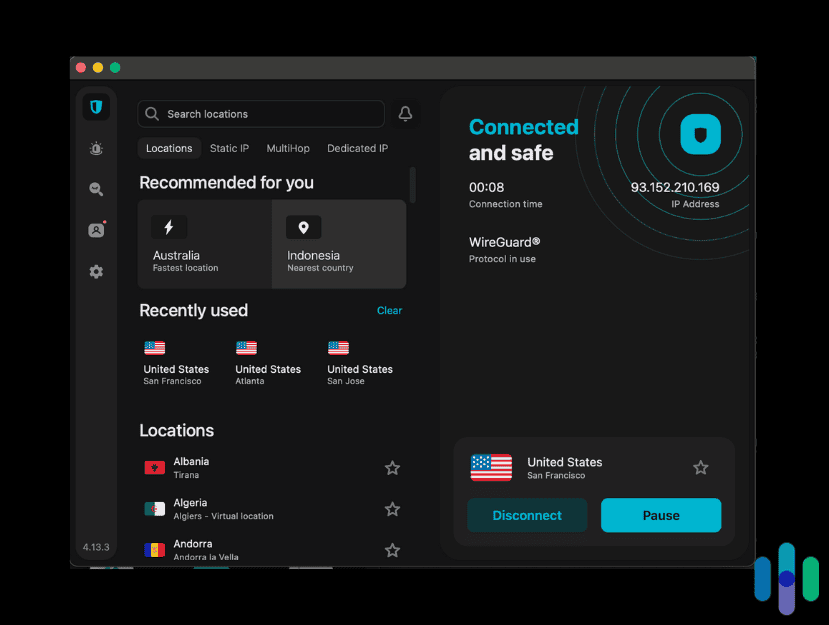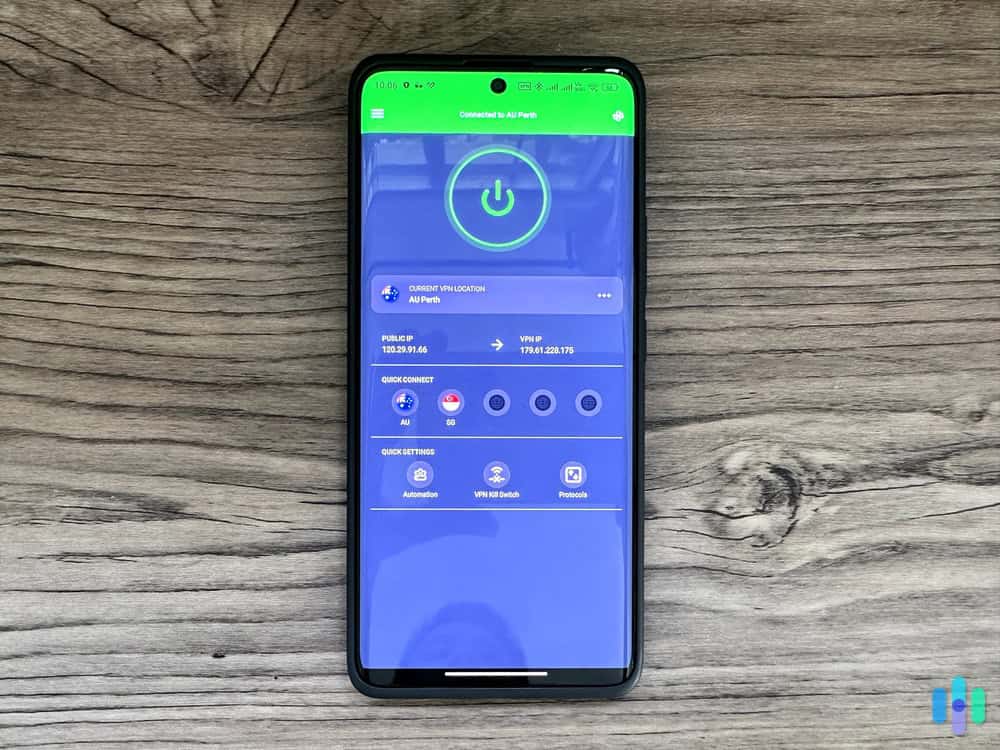
How Much Does Private Internet Access Cost in 2025?
One of our favorite affordable VPNs, Private Internet Access, ranges in price from $2.03 to $11.95 monthly.
- Provides excellent torrenting support
- Has very intuitive apps that are highly customizable
- Supports unlimited simultaneous connections
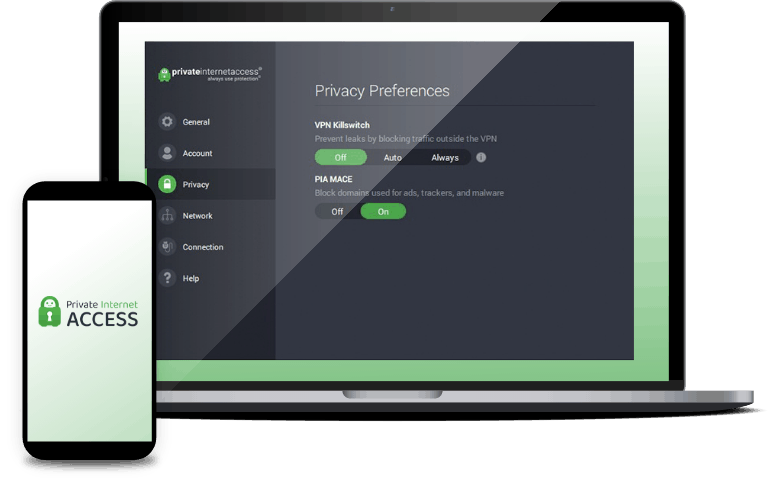
Private Internet Access (PIA) is typically priced as a bargain option compared to other popular VPNs, so the big question is: Do you get what you need for such a low price?
As you can read about in our Private Internet Access review, which is based on tests and our extensive VPN experience, we found a lot of things to like about PIA. We also found a few drawbacks. Overall, though, we think it’s one of the best cheap VPNs of 2025. Let’s go through the pricing details and what you get so you can see if PIA is for y-o-u.
Private Internet Access Subscription Options
Unlike other VPN providers, Private Internet Access offers only one plan tier. They still offer different subscription lengths, with longer subscriptions costing less per month on average. But to get the discounted rate, you need to shell out the cost of the entire contract upfront. Here’s a breakdown of what you can expect to pay for PIA.
| Private Internet Access subscriptions | 1 month | 1 year | 3 years + 3 months free |
|---|---|---|---|
| Total amount billed | $11.95 | $39.95 ($49.99 after the first year) | $79.00 |
| Average cost per month | $11.95 | $3.33 ($4.16 after the first year) | $2.03 |
For comparison, a VPN typically costs about $12 for a monthly plan. So, Private Internet Access is within the average. In fact, it’s cheaper than NordVPN, which is $12.99 per month and sits at the top of our best VPN for 2025 list. For the record, PIA VPN is fourth.
If you’re looking for a cheaper monthly plan, we recommend ProtonVPN. It’s only $9.99 per month. But paying month to month is always going to work to be the most expensive option. We recommend signing up for Private Internet Access’s three-year plan and making the most of the 30-day money-back guarantee if it’s not for you. You’ll end up saving nearly $400 over 24 months if you decide to stick with it.
>> PIA VPN Alternatives: ProtonVPN vs. NordVPN
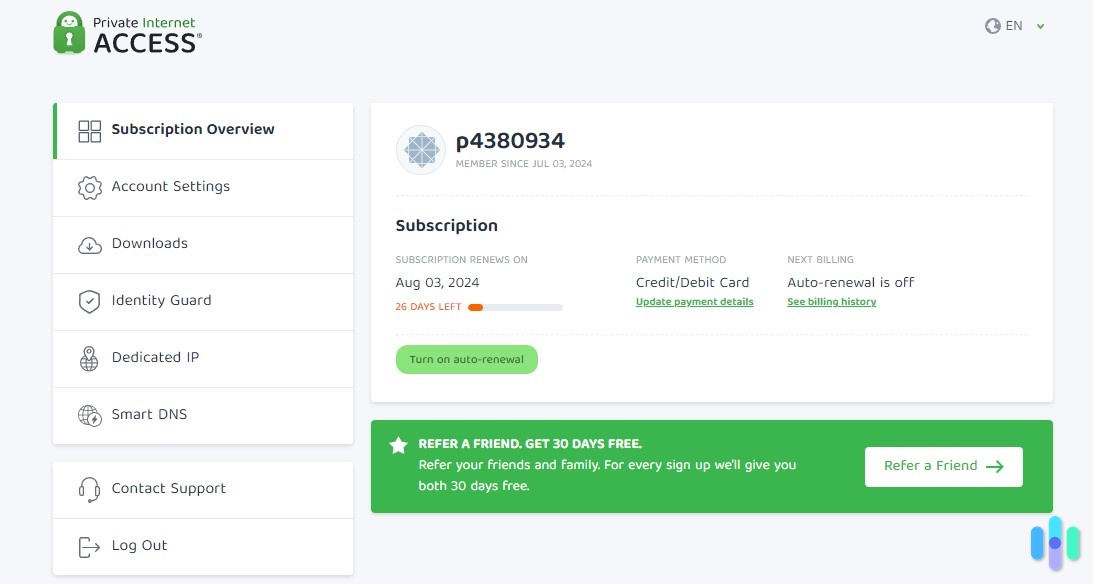
While we don’t necessarily recommend them, there are VPN services out there with lower monthly rates period. For example, FastestVPN sometimes features a deal that brings their price down to $0.83 per month since they give one month free. But, when we tested FastestVPN, we found that the price point came with a lack of a few key features we look for like split tunneling.
Other Option to Consider: Surfshark costs less than PIA with its two year subscription that averages out to $1.99 per month with their three free months. They also offer servers in more countries. Check out our Surfshark vs Private Internet Access guide to find out if Surfshark’s the right choice for you.
Does Private Internet Access Have a Free Trial?
Private Internet Access does have a free trial if you sign up via the VPN app on your Android or iOS device. The smartphone free trial is good for seven days, but it’s one-time use only. Moreover, you forfeit your eligibility to the 30-day money-back guarantee if you buy a subscription through Google Play or the App Store. More on that later.
In any case, here’s how it works:
- Download Private Internet Access’ Android or iOS app.
- Install the VPN app on your iPhone or Android and launch it.
- Choose the one-year plan and tap ‘Subscribe Now.’
- Check that the billing date is seven days from the current date.
- Verify the transaction with two-factor authentication or your Google Play/iCloud password.
- Enjoy Private Internet Access for free for seven days.
>> Related: The Top iPhone VPNs of 2025
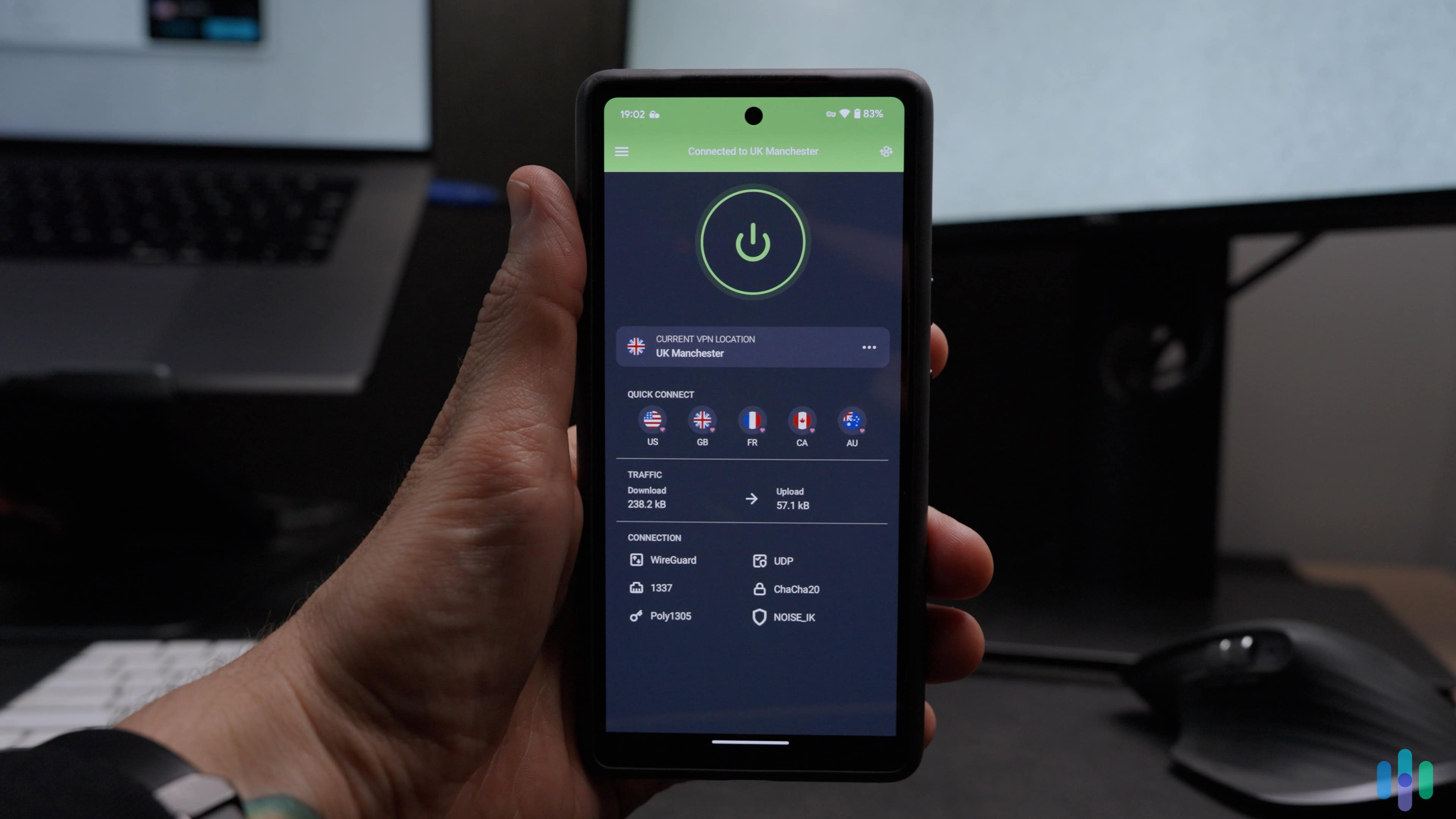
There are a couple of catches. First, auto-renewal is on by default, and you’ll need to turn it off at least 24 hours before your subscription ends. Otherwise, you’re locked into another term.
Second, renewals aren’t eligible for the 30-day money-back guarantee. It’s only available on the initial purchase. We recommend canceling your auto-renewal immediately, just in case you decide PIA isn’t for you.
If you want to maximize the free trial and money-back guarantee, here’s what we recommend:
- Sign up for the mobile app free trial.
- Cancel before the trial ends.
- Buy a three-year subscription (lowest rate) from PIA’s website.
- Test it for another 30 days. If you like it, you can keep it and the $2.03 monthly rate for the rest of your subscription. If you don’t, cancel it and request a refund within the first 30 days of your subscription.
In any case, we appreciate PIA providing a free trial and money-back option. Choosing a VPN isn’t a decision to be taken lightly, so we like seeing VPNs that offer free trials.
Expert Tip: The 30-day money-back guarantee comes standard with most VPNs, but some offer longer grace periods. For example, if you sign up for a CyberGhost subscription beyond the one month plan, you get 45 days to test the waters out. See our CyberGhost review and compare it to Private Internet Access to decide which to try first.
Buying a Private Internet Access Subscription
Because we wanted the money-back guarantee, we purchased our PIA subscription through the website, rather than through the mobile app. You could use your phone to buy a subscription, but make sure you do it through a browser. On the PIA homepage, clicking the ‘Get a PIA VPN’ button on the right (or top-right corner if you’re on mobile) will take you to the pricing plan page, where you can select your plan.
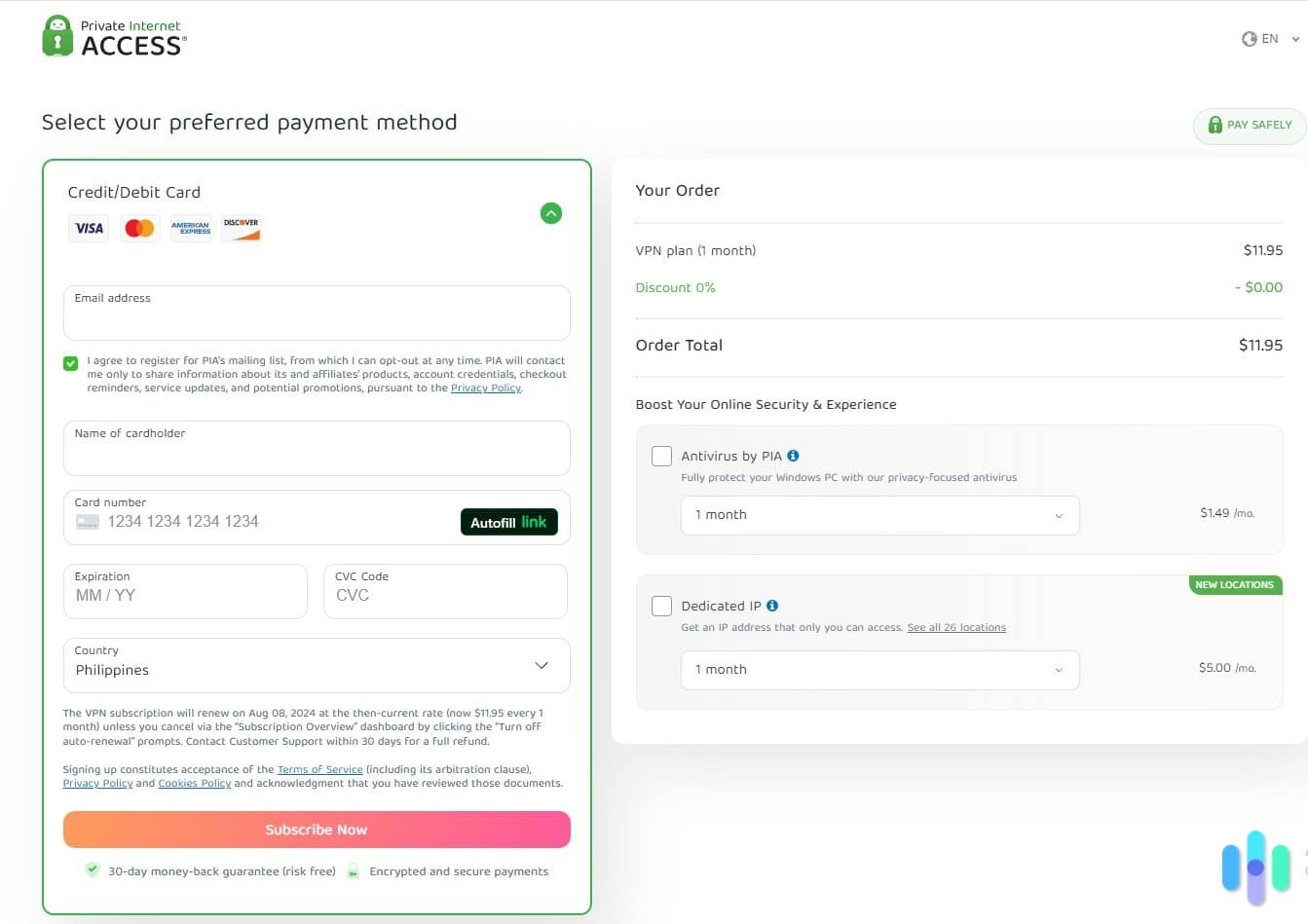
After we chose to buy a one-month plan, we had to pick a payment method: credit or debit card, PayPal, or crypto. We used a credit card, but we’ll go through the steps for each payment method.
Pay Via Credit/Debit Card
- Enter your email address.
- Enter your credit/debit card details.
- Click ‘Subscribe Now’ and complete the payment process.
- Check your email for the login credentials (username and password).
- Log in to your account and change the password. Make sure to create a strong password with uppercase and lowercase letters, numbers, and symbols.
- Download and install the VPN app to your devices.
- Log in using your username and new password.
Pay Via PayPal
- Click ‘Subscribe via PayPal’ and wait for the PayPal login page to load.
- Log in. Make sure that the email address associated with your PayPal account is active. It’s where PIA will send your login credentials.
- Complete the payment process.
- Follow steps four through seven above to start using PIA.
Pay Via Crypto
- Enter your email address.
- Wait for the BitPay page to load. BitPay will act as the payment processor, but you can use any cryptocurrency wallet you might have.
- Select or search your cryptocurrency wallet from the list.
- Connect your wallet to BitPay by logging in.
- Confirm which cryptocurrency you’d use for the transaction and complete the payment.
- Once paid, check your email for your PIA account credentials.
- Log in, change the password and download the app to your devices.
FYI: While credit/debit cards and PayPal are convenient, cryptocurrency payments provide anonymity that those other payment methods don’t. That’s handy for those who don’t want to be found to be using a VPN, like those living in countries where using a VPN could get them in trouble.
Are There Discounts?
The current three-year plan for about $2 per month is almost as cheap as we’ve seen from PIA. But that doesn’t mean the company won’t roll out future deals and packages. It’s possible that PIA might roll out new add-ons, subscription plans and additional free months for long-term commitments.
We particularly recommend checking out PIA around special sale events like Black Friday and Cyber Monday. In fact, we created a page specifically for VPN Black Friday and Cyber Monday deals. Check it around October for updates.
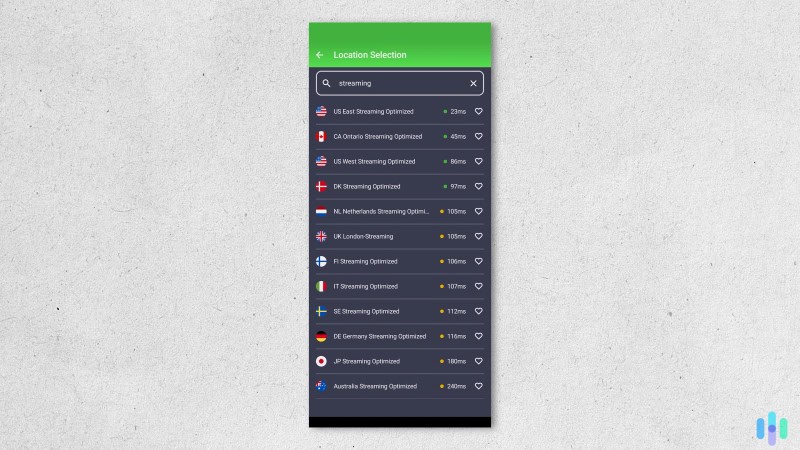
Private Internet Access Features to Test
You have your VPN, now what? Well, it’s time to put it to the test. There’s no rush because, again, you have 30 days to decide whether to keep it. But to help you out, here are Private Internet Access’ features you should definitely check out.
- Unlimited simultaneous connections: Private Internet Access allows users to simultaneously connect as many devices as they have, unlike when we tested ExpressVPN and were limited to eight connections.
- Servers: Private Internet Access has servers in 91 countries with varying availability based on the protocol used. On our Android device, we could only connect to servers in 88 countries. If you need more, check out our NordVPN review. They have servers in 118 countries.
- VPN protocol: The VPN protocol dictates how the VPN handles your traffic which impacts speeds and security. PIA uses OpenVPN and WireGuard, two of our favorite protocols. We recommend OpenVPN when connecting on computers and WireGuard when connecting on mobile devices.
- Encryption: Speaking of protocols, check which VPN encryption protocol best suits your VPN usage. PIA allows users to choose between 128-bit and 256-bit AES when using the OpenVPN protocol. 128-bit encryption offers faster speeds while 256-bit encryption offers stronger protections. That said, they both meet government standards for securing top secret documents.1
- Kill switch: The kill switch is a must-have feature that protects your privacy by turning off your device’s network connection when the VPN drops unexpectedly. PIA expands on the traditional kill switch by also offering an advanced kill switch that turns off your device’s network connection even when you turn off the VPN on purpose. This is ideal for users who want an always-on VPN.
- Split tunneling: PIA was full of customizable features when we tested it, and one of our favorites was the split tunneling. It’s a common feature that lets you select apps that can bypass the VPN, but in PIA’s case, you can also enter IP addresses. That means you can also force websites, locally-connected devices (e.g., wireless printers) and servers to bypass the encryption.
- RAM-based servers: You can’t exactly test it out, but it’s good to know that PIA has RAM-based servers. It’s a new type of technology that better protects users’ privacy because servers running on random access memory (RAM) get all their data wiped after every reboot. It’s one reason why PIA is one of our favorite VPNs with a ‘no-logs’ policy.
- Logging options: We saved the best for last; Private Internet Access is one of the few VPNs that lets users completely opt out of data collection. While it never records IP addresses and websites visited, they can log statistical metrics, such as protocols used or how a connection was established to improve its services, if you actively opt in.
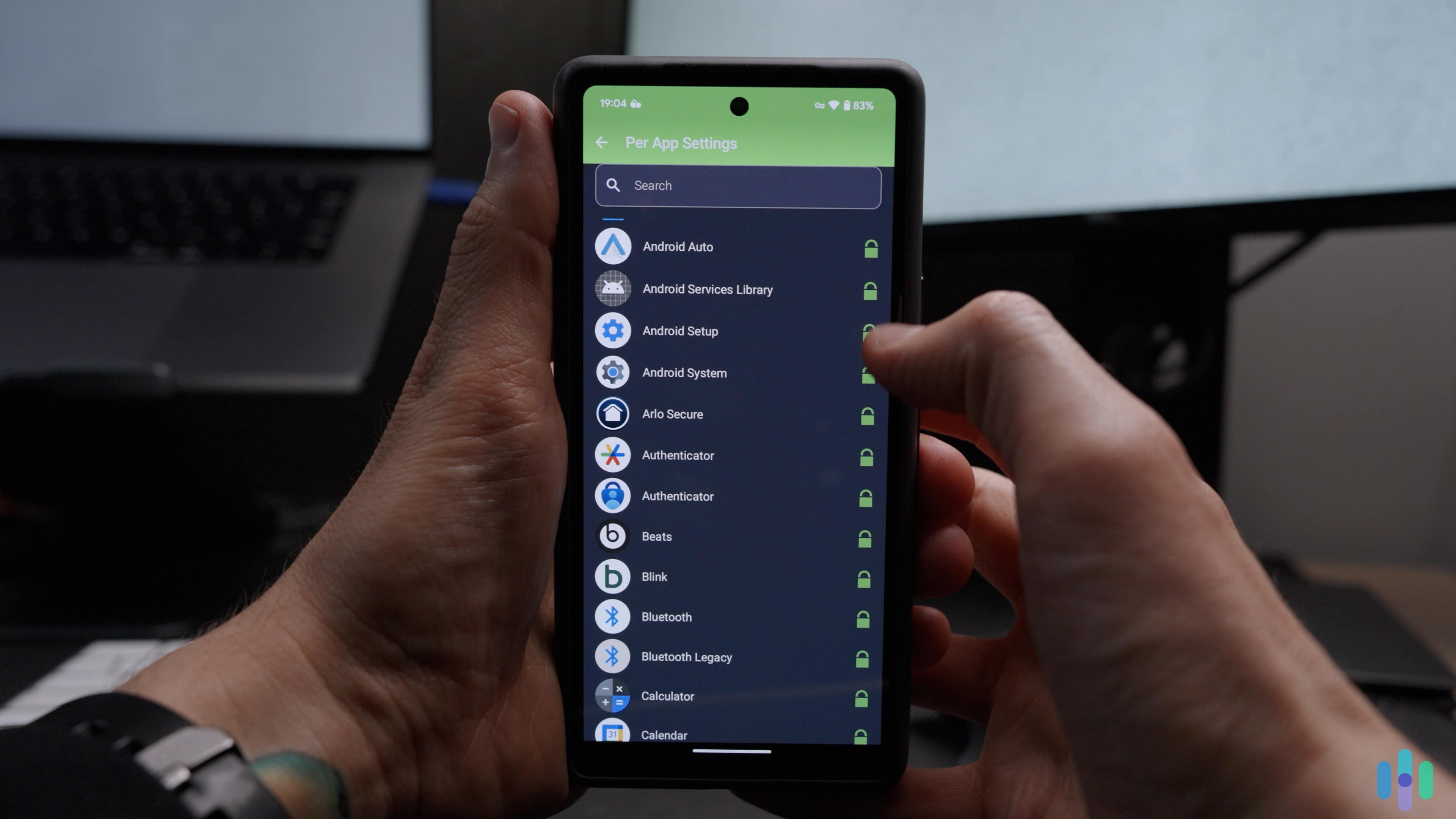
While you can still get your money back, we recommend testing PIA speeds on your devices. We regularly conduct speed tests of the top VPNs as part of our testing process, but results vary based on factors like location, device type, and encryption protocol. Though your results will likely vary, we had the following results:
- Private Internet Access is capable of fast download speed, accessing more than 90 percent of our network speed. We’ve tested VPNs that could only provide about 60 percent of our original speed.
- PIA proved particularly fast on Windows, as both the download and upload speeds remained high when tested on a Windows 11 laptop.
- On macOS, Android and iOS, the upload speed dropped considerably higher than the download speed. PIA was able to give us only around 70 percent of our network’s original upload speed.
>> Related: The Fastest VPNs of 2025
Pro Tip: Also check PIA’s ability to unblock content from your favorite streaming platforms. In our tests, PIA was unable to bypass Disney+ and Hulu’s VPN blocks.
Canceling Private Internet Access
There are a lot of VPN services out there and you should test a few of them before committing to one you like. Because PIA and others typically offer a money-back guarantee, it’s easy to test drive a few for one month to see what you prefer.
After we finished testing PIA, we canceled our VPN subscription to see how easy it is to do so. And as it turned out, it wasn’t the easiest. There were two ways, each with a different result:
- Stop auto-renewal: Use this option if you wish not to be charged again once your current subscription ends. You will continue to have access to the VPN, but you will not get a refund if you’re still within the 30-day money-back period.
- Cancel/delete your account: Use this option if you want to totally disable your VPN access. If you’re within the 30-day refund period, you may request a refund. Note that you need to reach out to customer support to request the refund. They won’t automatically refund you if you disable the VPN within the 30-day refund period. Deleting your account after the 30-day refund period means you’ll lose your account and the money you paid.
It all depends on what you’re trying to cancel and where you are on your subscription. Unfortunately, PIA VPN doesn’t offer prorated refunds for on-going subscriptions. So beyond the 30-day money-back guarantee, you can only cancel auto-renewal. You’ll keep your VPN account active for the rest of the subscription you signed up for.
How to Stop Auto-Renewal
The first option is easier because it only turns off auto-renewal. You can do it right on your dashboard.
- Log in to your Private Internet Access client dashboard. You can also open your VPN app, go to the settings and choose Account.
- In the Subscriptions Overview tab, click the ‘Turn Off Auto-Renewal’ button under ‘Next Billing.’
- Click ‘Continue Cancellation’ and answer the one-question survey that follows.
- Select ‘Turn Off Auto-Renewal’ to finalize.
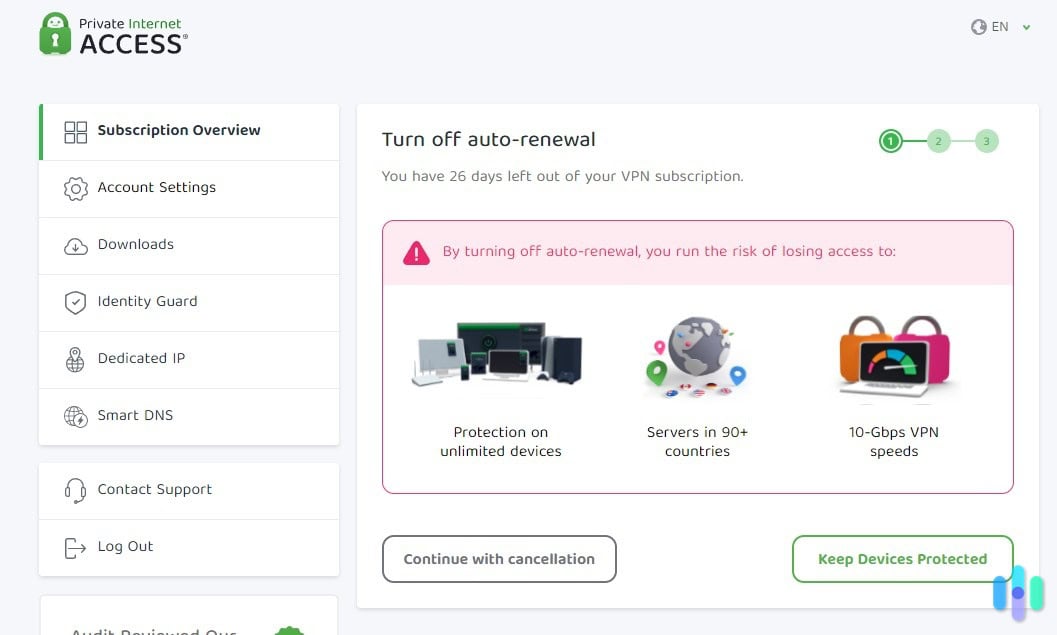
We always recommend switching off auto-renewal. In most situations, you be aware that your VPN subscription has expired and can simply renew it if you want to do so. Shutting off auto-renewal prevents both a surprise withdrawal and getting locked into a long-term commitment that you don’t want.
How to Cancel and Request a Refund
If you want your money back and it’s been more than 30 days since you bought PIA, you must send an email to support@privateinternetaccess.com or submit a service request ticket. You will be asked for the email address used to sign up for PIA and your order number, which is in the welcome email you got when you signed up. We found that it takes two to three business days to get a response. If your request is approved, it takes five to 10 days for it to appear in your bank account. For comparison, Surfshark lets users request a refund via automated chatbot.
FYI: While most VPNs offer a 30-day money-back guarantee for their long-term subscriptions, it is not required by law.2 That’s why it’s important to always read the fine print of the guarantee to ensure you qualify.
Is Private Internet Access Worth It? The Final Verdict
Although we get into more depth in our PIA review, you’re probably wondering if this VPN provides enough in return for its low price tag. Keep in mind: Other top VPNs do provide more features, but for more money.
Given the low cost of the three-year plan, you shouldn’t expect a ton of bells and whistles. However, PIA does deliver on what we think are the essentials: good speeds, kill switch, split tunneling, strong encryption protocol, and strong no-logging practices. It also offers unlimited simultaneous connections, which isn’t something offered by more expensive services.
Of course, there are also downsides to consider, like the fact that the best price requires a three-year commitment, the subpar upload speeds and the inconsistent streaming capability. If those things are deal-breakers to you, read our Surfshark review and UltraVPN review for other top-rated affordable options.
Private Internet Access Top 5 FAQ
-
Is Private Internet Access a good VPN?
Private Internet Access is a good VPN with fast download speeds, strong encryption, effective tunneling and a customer-centric privacy policy. However, the upload speed and streaming access could use improvement. If you’re looking for a VPN to protect your privacy, we’d recommend PIA VPN.
-
Is Private Internet Access hard to use?
Private Internet Access isn’t hard to use; it’s the contrary. It has one of the simplest VPN apps, which lets users connect to the best available server with just one click. While it offers lots of customizations in the settings, tinkering with those is optional because Private Internet Access works fresh off installation.
-
Does Private Internet Access have a free VPN?
No, Private Internet Access doesn’t have a free VPN. There is a commitment-free seven-day free trial if you sign up for a subscription via an Android or iOS smartphone, though. If you choose that option, you’ll be able to use PIA for seven days before starting to pay.
-
What’s the best Private Internet Access subscription to buy?
The best Private Internet Access subscription to buy depends on how long you’ll need a VPN. The monthly plan is the most flexible, best for those looking for a VPN for short-term use. The same is true for the six-month plan. However, if you’re looking to access big savings, go with the three-year plan. It averages only $2.03 per month, five times cheaper than the monthly plan.
-
What does Private Internet Access’ ‘no-logs’ policy entail?
Private Internet Access’ ‘no-logs’ policy means it won’t log your IP address and the websites you visit whenever you connect to its services. It also won’t record your device ID and other nonpersonal information that could compromise your privacy.
-
Cybersecurity & Infrastructure Security Agency. (2024). Transition to Advanced Encryption Standard (AES).
-
Law Info. (2024). Legal Considerations for Returns and Refunds in E-commerce.


